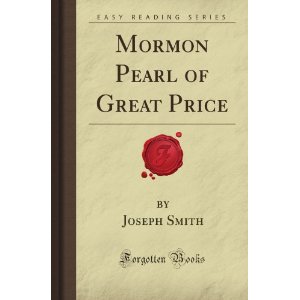Difference between revisions of "Pearl of Great Price"
| Line 34: | Line 34: | ||
[[it:Perla di Gran Prezzo]] | [[it:Perla di Gran Prezzo]] | ||
[[pt:Perola de Grande Valor]] | [[pt:Perola de Grande Valor]] | ||
| − | |||
Latest revision as of 19:57, 21 February 2023
The Pearl of Great Price is a collection of sacred writings and one of the four standard works that are accepted as scripture by the members of The Church of Jesus Christ of Latter-day Saints. The Pearl of Great Price includes these individual books:
- The Book of Moses
- The Book of Abraham
- Joseph Smith-Matthew
- Joseph Smith-History
- The Articles of Faith
This book of scriptures was first published at Liverpool, England, in 1851 by Franklin D. Richards, who was then the president of the British Mission and a member of the Quorum of the Twelve Apostles of the Church of Jesus Christ. Reason for the publication was the request from converts for further information about the Church.
The Book of Moses or Selections from the Book of Moses consists of several revelations given to Joseph Smith while he was revising the Bible under inspiration, beginning in June 1830.
The Book of Abraham contains writings of Abraham, and it is a translation from some Egyptian papyri that the Church obtained in 1835. It includes a record of the life of the patriarch Abraham and also a description of the creation of the world that is similar to that recorded in Genesis and in the Book of Moses.
Joseph Smith-Matthew is an extract from the testimony of Matthew taken from Joseph Smith's translation of the Bible.
Joseph Smith-History includes excerpts from Joseph Smith's official testimony and history, which he prepared in 1838.
The Articles of Faith of The Church of Jesus Christ of Latter-day Saints include thirteen untitled statements previously published in the Times and Seasons in March 1842.
Additions and Differences
The Book of Moses is part of the translation of the Bible, so it is similar to the King James Version. There are few contradictions, but there are many additions. The most important additions are a record of Moses' face-to-face experience with God, and a detailed story of Enoch and the City of Enoch.
The Book of Abraham doesn't contradict the Bible—Abraham's story agrees with the story in Genesis. Information is given regarding the foreordination of Abraham, alluding to a pre-mortal existence. Abraham elaborates on his experiences in Haran, as well as his desire to hold the priesthood of his fathers.
